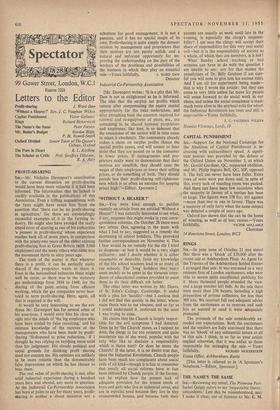Letters to the Editor
Profit-sharing J. Ward Daw `Without a Hearer?' Rev. J. C. Vaughan Wilkes Capital Punishment Victor Gollancz Rings Richard Bickersteth The Name's the Same Peter Forster Mr. Butler's Budget Gordon Bligh, P. H. Nowell-Smith Oxford Divided Senior Tutor of The Queen's
College, Oxford
The Pure in Heart R. L. Kitching The Scholar as Critic Prof: Geoffrey Tillotson,
R. A. Auty PROFIT-SHARING SIR,—Mr. Nicholas Davenport's contribution to the current discussion on profit-sharing would have been more valuable if it had been informed. The information that he lacked is readily available in the publications of this Association. Even a trifling acquaintance with the facts might have saved him from the assertion that 'there can be no profit-sharing in agriculture,' for there are outstandingly successful examples of it in the farming in- dustry. He might also have avoided the really stupid error of quoting as one of his authorities 'a pioneer in profit-sharing' whose experience reaches back all of seven years, in comparison with the ninety-two years of the oldest existing profit-sharing firm in Great Britain (with 3,000 employees) and the many others who came into the movement thirty to sixty years ago.
The truth of the matter is that wherever there is a profit, it can be perfectly easily shared if the proprietor wants to share it. Even in the nationalised industries there might well be room, as there was in the statutory gas undertakings from 1894 to 1948, for the sharing of the gains arising from efficient working, which the gas companies never hesi- tated to term profit-sharing. Here, again, all that is required is the will.
It would be very interesting to see the evi- dence Mr. Davenport has for several other of his assertions. 1 would envy him his close in- sight into the minds of 'the big employers who have been misled by false reasoning,' and his intimate knowledge of the motives' of the managements who have been made by profit- sharing 'ill-disposed to price reductions.' if I thought he was relying on anything more solid than his judgement. His cloudy political and social grounds for disliking profit sharing need not concern me. His opinions are unlikely to be more reliable than the demonstrably false impressions on which he has chosen to base them.
The real value of profit-sharing is not, after solid industrial experience during a hundred years here and abroad, any more in question. As the Industrial Co-Partnership Association has been at pains to say for many years, profit- sharing is neither a direct incentive nor a substitute for good management; it is not a panacea, and it has no special magic of its own. Profit-sharing is quite simply the demon- stration by management and proprietors that their motives are not purely selfish, and a natural and unforced opportunity for im- proving the understanding on the part of the workers of the problems and possibilities of the business in which they play an essential role.—Yours faithfully, J. WARD DAW Director Industrial Co-Partnership Association
[Mr. Davenport writes: 'It is a pity that Mr. Daw is not as enlightened as he is informed. The idea that the surplus net profits which remain after compensating the equity capital appropriately for the risks undertaken, and after ploughing back the amounts required for renewal and re-equipment of plant, etc., are something to be shared between proprietors and employees, like loot, is so indecent that the conscience of the nation will in time come to reject it absolutely. The community already stakes a claim on surplus profits (hence the special profits taxes), and will sooner or later insist that they are passed on to the consumer in lower prices. If managements and pro- prietors really want to demonstrate that their motives are unselfish, they should raise the wages of their employees or lower their selling prices, or do something of both. They should parade less their profit-sharing self-righteous- ness which is so often an exercise for keeping prices high!'—Editor, Spectator.]


































 Previous page
Previous page